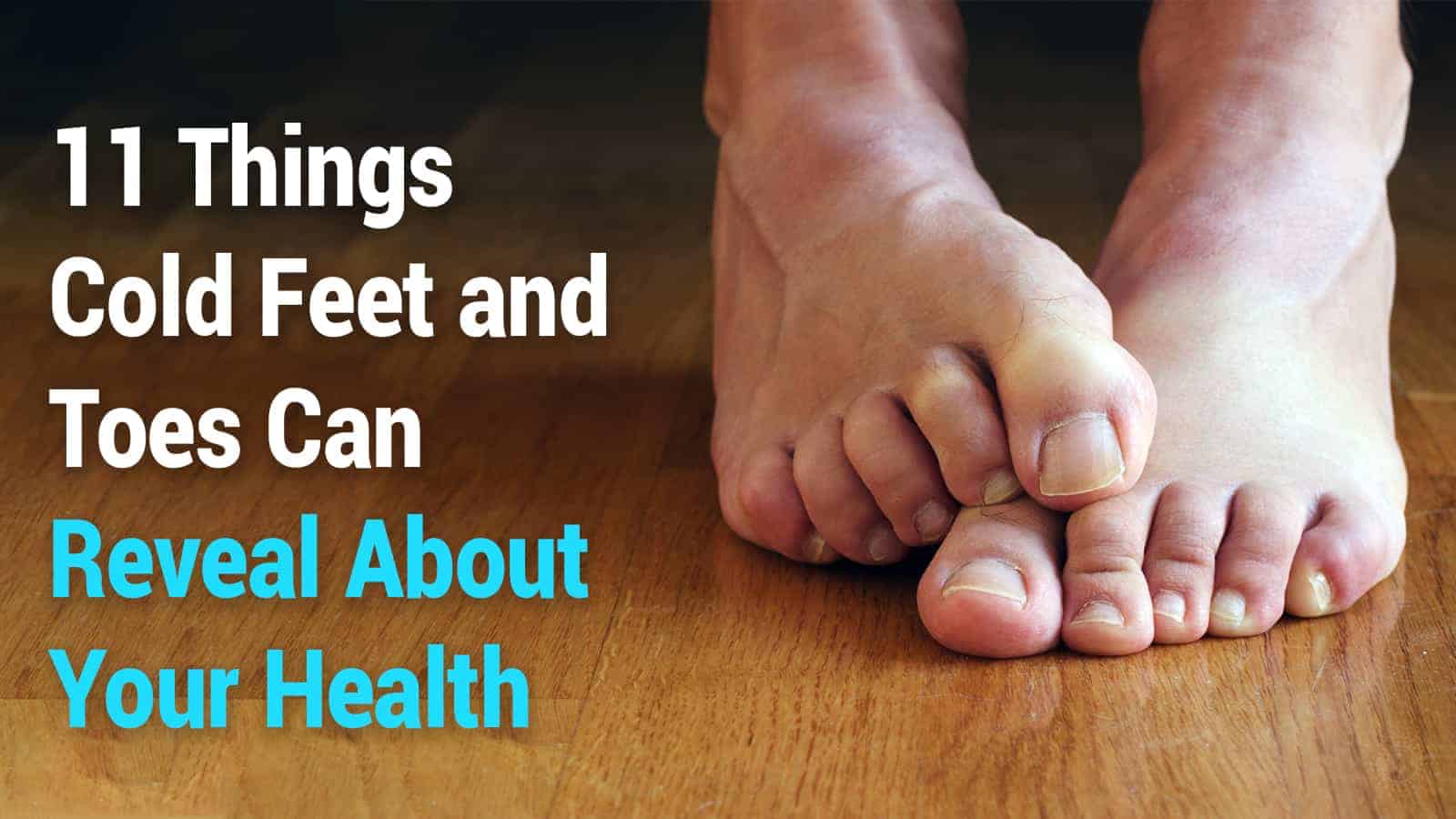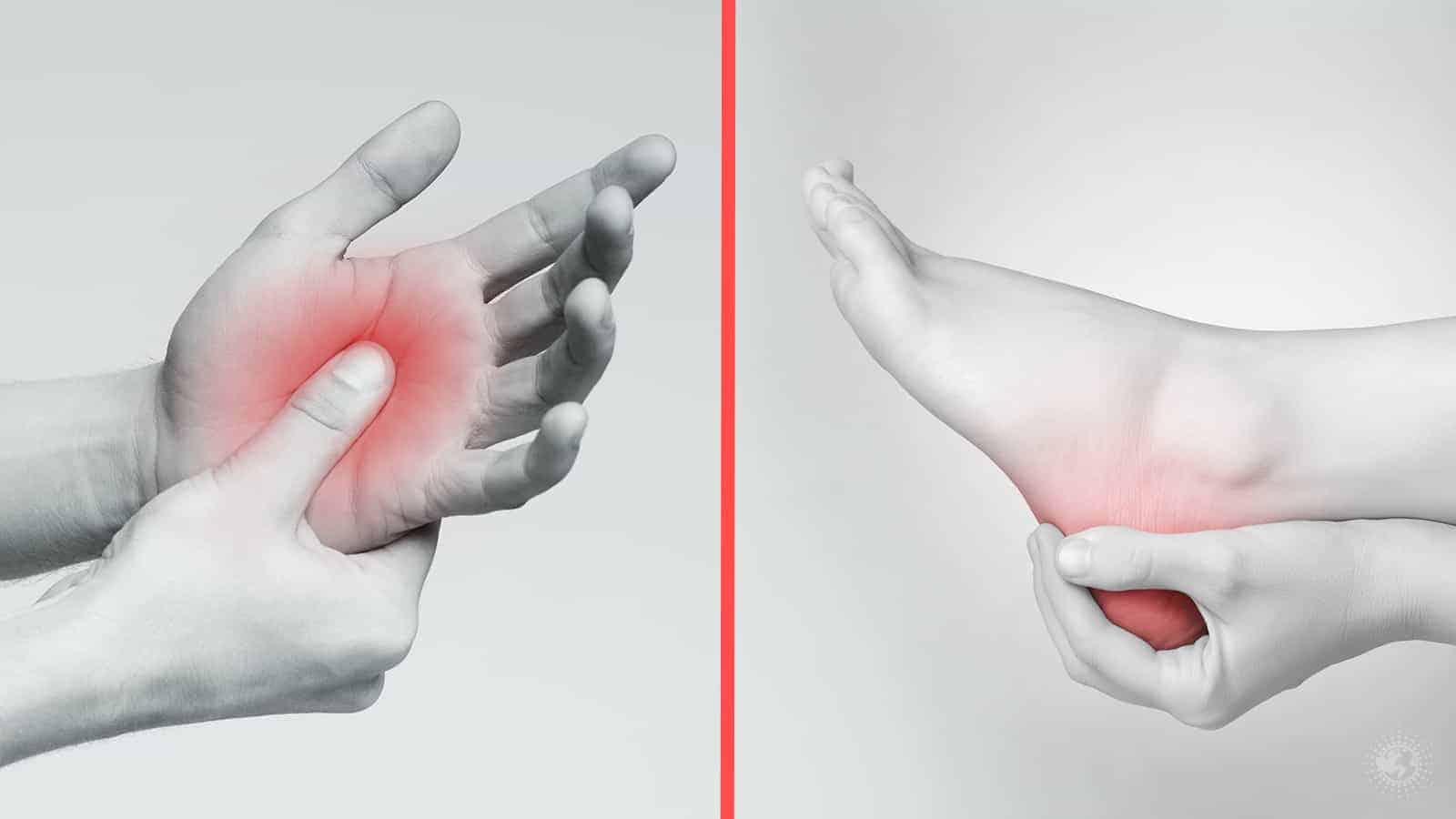You may think it is not a big deal that your feet and toes are always cold. But chilly toes and feet aren’t something to ignore. You might chalk the chill up to nothing, but you could be making a mistake. Indeed, you could find that you have the first symptoms of an underlying health problem. Knowing the early signs of trouble can help you manage a previously undetected disease and prevent further consequences. Here is a handy list of eleven common health conditions associated with cold feet and toes.
11 Health Conditions Revealed by Cold Feet and Toes
You might find your cold feet and tingly toes annoying. But the truth is, they could point to a more severe underlying cause. Take a look.
1 – Diabetic neuropathy
Tingling in your hands and feet is a common complication of type 1 and 2 diabetes. Diabetic neuropathy is nerve damage that can happen if you have diabetes. It usually develops slowly, even over a decade before it’s found. The most frequent first symptom of this condition is the feeling of numbness or a sense of “pins and needles” in your feet. Other symptoms can include those on this list:
- Hypersensitivity to touch or loss of touch
- Hard time walking
- Burning feeling in your feet, mostly at night
- Feeling weak in your muscles
- Feeling bloated
- Stomach problems-nausea, vomiting, or indigestion
- Irritable bowel syndrome (IBS)
- Dizzy when you stand up
- Can’t empty your bladder
- Vision problems
See your primary care physician if you experience these symptoms. They can help get your blood sugar levels down with mediations. They will also give you recommendations for diet and exercise to control diabetes.
2 – Arteriosclerosis
Arteriosclerosis is a cardiovascular disease that causes hardening or restricting of the arteries. Over time, you might plaque can build up inside the walls. This blockage prevents proper blood flow, so your arteries get blocked. Arteriosclerosis is at the top of the list of causes of death in the United States. Having cold feet or weird nerve sensations could be a sign your circulation is blocked due to a lack of proper blood flow due to arteriosclerosis. You can prevent fatty deposits from accumulating in your arteries by following the healthy tips listed below:
- Stop smoking
- Eat a healthy diet
- Get exercise
- Keep a record of your cholesterol levels, blood pressure, BMI, and weight
3 – Raynaud’s disease
Raynaud’s disease or phenomenon impacts your blood vessels, causing them to not send blood to your feet or hands. The phenomenon happens when you’re out in the cold or when you experience stress. Other symptoms include numbness and coldness in fingers and toes. It’s caused by narrowing or restricting in your blood vessels. Primary Raynaud’s phenomenon is most common in women aged 15 to 25, who live in a cold climate. Secondary Raynaud’s phenomenon occurs in people who are 35 to 40 years of age who have connective tissue diseases like the following list:
- Scleroderma
- Lupus
- Sjogren’s syndrome
- Carpal tunnel syndrome
- Blood vessel diseases
Some medications have been known to cause Raynaud’s phenomenon, including high-pressure medications, migraine medications, over-the-counter cold medicine, and narcotics. Specific jobs can put you at risk for Raynaud’s phenomenon, such as working with chemicals, using certain tools all the time like a jackhammer.
4 – Vascular disease
Your vascular system includes your veins, capillaries, and arteries, which circulate blood throughout your body. When you have vascular disease, it affects your circulatory system, causing blockages and restricting your blood flow to all body parts. You’re more prone to vascular disease if you have any of these risk factors:
- High cholesterol
- High blood pressure
- Injury to your veins
- Infection in your veins
- History in your family of heart disease
- Take certain medications
- Overweight
- You’re older, the older you get, the more prone you are to vascular diseases
- Don’t exercise
- Smoke
- Sitting a lot
5 – Hypothyroidism
Hypothyroidism affects about five percent of the adult population in the United States, and it’s more common in women than men. Sometimes called an underactive thyroid, hypothyroidism occurs when your thyroid gland doesn’t make enough thyroid hormones for your body. It can be fatal if left untreated. The thyroid gland impacts nearly every organ in your body, including your heart and metabolism. Because your thyroid gland controls your heart and body temperature, if your thyroid gland is not working correctly, you’ll have circulation problems such as cold feet and toes. Other symptoms of hypothyroidism include the following:
- Feeling cold all the time
- Tiredness
- Puffiness if your face
- Joint pain
- Extra dry skin
- Slow heart rate
- Depression
- Irritability
Talk to your doctor if you have some (or all) of these signs. They will give you a simple blood test to check thyroid hormones. You can take thyroid replacement medication if your thyroid isn’t functioning correctly.
6 – Poor circulation
Poor circulation is usually due to other health problems. The most common reason for poor circulation is being overweight, heart problems, blood clots, diabetes, or artery disease. Symptoms of circulation problems include these:
- Tingling
- Numbness
- Stinging pain in your legs or arms
- Muscle cramps
If you’re experiencing symptoms of poor circulation, talk with your doctor immediately. Your doctor can do tests to find the cause. The typical tests include the following:
- Blood pressure checks
- Test for Raynaud’s disease
- CT scan or ultrasound for blood clots or blockages
- Blood sugar test for diabetes
7 – Peripheral neuropathy
This is another condition that can result due to complications related to diabetes. Peripheral neuropathy is nerve damage that affects your legs and feet. It’s prevalent. About one half of those who have diabetes get peripheral neuropathy.
Common symptoms include
- Tingling in feet or hands
- Pain
- Weakness in your hands and feet
- Lack of feeling in your feet
- Sharp or burning pains in your feet
- Pain to any touch
Having peripheral neuropathy puts you at risk for infection and injury since you lose the ability to feel correctly. In the most severe instances, it can lead to amputation.
8 – Frostbite
It’s easy to get frostbite and not realize it. If you’ve been outside in cold temperatures too long, you’re at risk for frostbite. In the right conditions, frostbite can happen in less than 30 minutes. You feel frostbite mostly in your extremities, such as your toes and fingers, but you can also get it in your nose, ears, cheeks, or chin. Your feet may feel numb and tingly. Other symptoms of frostbite include these signs:
- Prickly feeling in your toes
- Numbness
- Gray-colored skin
- Stiffness in your hands and feet
Dress appropriately in cold weather. Don’t stay out too long in frigid weather.
9 – Fibromyalgia
Fibromyalgia is a chronic condition that causes you extreme fatigue and musculoskeletal pain. Other symptoms of fibromyalgia include these additional red flags:
- Cold feet and hands
- Temporomandibular joining dysfunction (TMJ)
- Irritable bowel syndrome (IBS)
- Cystitis
- Endometriosis
- Mood issues
- Memory problems
- Brain fog
- Insomnia
10 – Vitamin B deficiency
If you’re not getting enough B vitamins, you may experience tingling in your feet. Your deficiency may be due to other health problems or a diet lacking enough B vitamins. Other symptoms of having a vitamin B deficiency include the following:
- Feeling extremely tired
- Tingling in your hands and feet
- Constant headaches
- Nausea
- Gut problems like IBS
- Dizziness
- Intermittent shortness of breath
If you are experiencing any of these symptoms, talk with your doctor. They can run tests to determine if you have a vitamin B deficiency.
11 – Anxiety
Did you know that stress, panic attacks, and anxiety can cause your feet and toes to feel cold? You may have experienced that odd feeling in your gut or gotten a stress-related headache. When you get stressed, it causes your blood flow to get redirected, so it doesn’t go to your extremities but towards the larger organs in your body. When you get stressed, it’s a “fight or flight” system your body goes into. Even if you are not in a life-threatening scenario, your body may react to the stress as if it were life-threatening.
Final Thoughts on Recognizing When Cold Feet and Toes Might Point to a More Significant Problem
It’s easy to put off health issues when life is busy, but it may be time for a check-up if you’re experiencing chilly toes and feet. Many of these conditions develop slowly over time. That is all the more reason to get an early diagnosis to control the disease. These are eleven common ailments that affect women more than men. So, if you’re a woman, listen up. Let your cold feet and toes motivate you to explore what’s happening with your body. It could be a disease or condition, or it could be the way your body deals with stress. Whatever the cause, your health is worth it. Plus, you’ll enjoy having warm toes and feet again. Take care of yourself, and be well.

















 Community
Community

